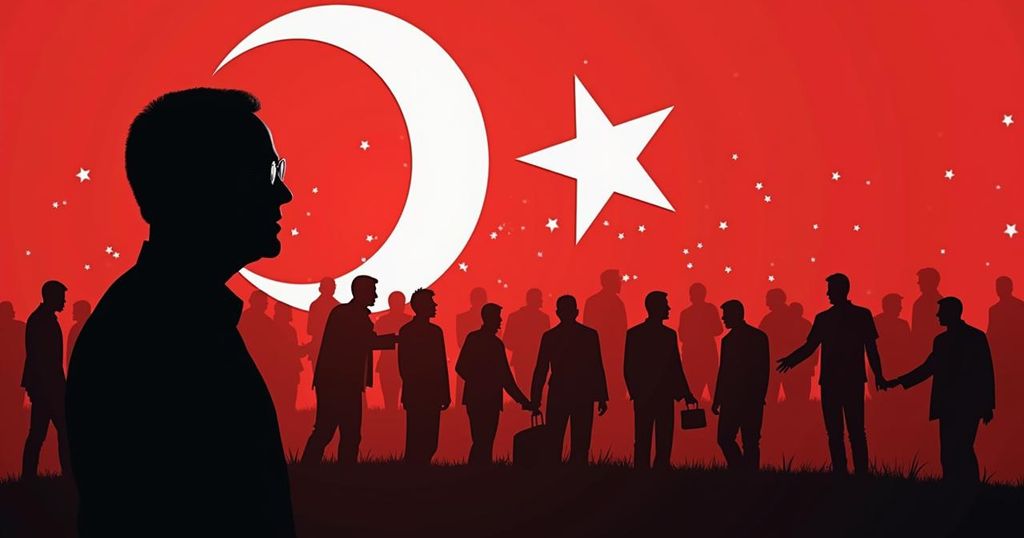Tunisia Faces Presidential Election Amid Concerns of Autocracy and Electoral Integrity
Tunisians are voting in a presidential election that many critics claim lacks fairness and freedom, signaling a challenging chapter for democracy in the nation. President Kais Saied, who assumed power through controversial measures and has increasingly consolidated authoritarian rule, faces minimal opposition amid a crackdown on dissent. Observers believe this election may signify the end of Tunisia’s democratic transition, which was initially inspired by the Arab Spring. The absence of credible candidates and manipulation of electoral laws raise further doubts about the integrity of the electoral process.
On Sunday, Tunisians are participating in a presidential election characterized by widespread skepticism regarding its fairness and freedom, reflecting a disheartening conclusion to the nation’s protracted quest for political liberty that commenced during the Arab Spring. Observers and opposition leaders express concerns that this election may signify the final breath of democracy in Tunisia, where the protests of 2011 once served as a catalyst for democratic movements throughout the Middle East. Although Tunisia managed to maintain relative stability post-revolt while other neighboring countries descended into chaos or military coups, recent years have seen the country drift towards autocratic rule, sometimes with public backing amid grave economic challenges. Experts, such as Sarah Yerkes from Carnegie’s Middle East Program, contend that superficially, the election might seem to follow normal democratic conventions, yet analysis reveals a stark deviation from the principles of a free and fair election. “This election really spells the end of Tunisia’s democratic transition,” Yerkes asserts. Incumbent President Kais Saied, a former constitutional law professor, enjoyed a landslide victory in 2019, reflecting voter rejection of the political mainstream. However, by 2021, he had initiated a series of power consolidations that critics labeled a “self coup,” including the suspension of parliament and the empowerment to rule by decree. Despite his restructuring of the political landscape, voter turnout for subsequent referendums plummeted, indicating widespread disengagement among the populace. In pursuit of a second term, Saied faces minimal competitive pressure as many potential challengers have been disqualified or imprisoned. Out of numerous candidates, only one, Ayachi Zammel, remains in contention, while notable opposition leaders have faced harsh imprisonments under dubious charges. As noted, “In the end, everyone who tried to run has been disqualified or thrown in jail, or both,” which illustrates the restrictive political landscape surrounding these elections. Authorities have imprisoned political figures such as Rachid Ghannouchi, leader of the main opposition party, highlighting the severe crackdown on dissent. The election has been defined as “not really a contest” due to the diminishing space for legitimate opposition amid rigorous legal constraints manipulated by Saied. Additionally, recent amendments to electoral laws have further stripped away checks on the election commission, consolidating Saied’s control over the electoral process. Maher Madhioub, an Ennahda politician, remarked on the disillusionment felt among the youth toward Saied’s actions, despite his former role as a law educator: “You are a law professor, how can you do this?” While some citizens, including farmers and residents, express intention to support Saied, hoping he may address their challenges, the overarching sentiment among critics and observers points towards a marked decline in Tunisia’s political freedoms and democracy. The ongoing crackdown on dissent and manipulation of electoral laws starkly contrast with the initial hopes for change that characterized the post-Arab Spring era.
The political landscape in Tunisia has been shaped significantly since the 2011 Arab Spring when mass protests led to the overthrow of the long-standing president, inspiring similar movements across the Middle East. Tunisia was initially lauded for its transition to democracy; however, over the past few years, there has been a noticeable regression toward autocracy, especially under the leadership of President Kais Saied, who has consolidated power through various legislative changes and actions that have stifled dissent and sidelined potential political competitors. The current election cycle is viewed by many as a culmination of this trajectory, with significant concerns regarding the integrity of the electoral process.
The presidential election taking place in Tunisia reflects a critical juncture in the nation’s political journey, as many experts and opposition voices indicate that it likely marks the demise of the democratic aspirations ignited during the Arab Spring. The consolidation of power by President Saied, coupled with the suppression of opposition figures and the alteration of electoral laws, has rendered this election disproportionately tilted in favor of the incumbent. As Tunisia grapples with political repression and public disenchantment, the hope for a renewed democratic future appears increasingly bleak.
Original Source: www.washingtonpost.com




Post Comment